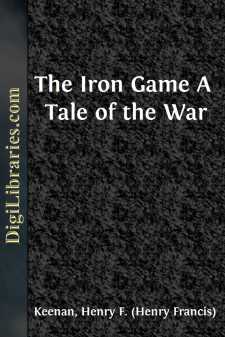Categories
- Antiques & Collectibles 13
- Architecture 36
- Art 48
- Bibles 22
- Biography & Autobiography 813
- Body, Mind & Spirit 142
- Business & Economics 28
- Children's Books 14
- Children's Fiction 11
- Computers 4
- Cooking 94
- Crafts & Hobbies 4
- Drama 346
- Education 46
- Family & Relationships 57
- Fiction 11829
- Games 19
- Gardening 17
- Health & Fitness 34
- History 1377
- House & Home 1
- Humor 147
- Juvenile Fiction 1873
- Juvenile Nonfiction 202
- Language Arts & Disciplines 88
- Law 16
- Literary Collections 686
- Literary Criticism 179
- Mathematics 13
- Medical 41
- Music 40
- Nature 179
- Non-Classifiable 1768
- Performing Arts 7
- Periodicals 1453
- Philosophy 64
- Photography 2
- Poetry 896
- Political Science 203
- Psychology 42
- Reference 154
- Religion 513
- Science 126
- Self-Help 84
- Social Science 81
- Sports & Recreation 34
- Study Aids 3
- Technology & Engineering 59
- Transportation 23
- Travel 463
- True Crime 29
The Iron Game A Tale of the War
Categories:
Description:
Excerpt
CHAPTER I.
THE BOY IN BLUE.
When expulsion from college, in his junior years, was visited upon Jack Sprague, he straightway became the hero of Acredale. And, though the grave faculty had felt constrained to vindicate college authority, it was well known that they sympathized with the infraction of decorum that obliged them to put this mark of disgrace upon one of the most promising of their students.
All his young life Jack had dreamed of West Point and the years of training that were to fit him for the glories of war. He knew the battles of the Revolution as other boys knew the child-lore of the nursery. He had the campaigns of Marlborough, the strategy of Turenne, the inspirations of the great Frederick, and the prodigies of Napoleon, as readily on the end of his tongue as his comrades had the struggles of the Giant Killer or the tactics of Robinson Crusoe. When, inspired by the promise of West Point, he had mastered the repugnant rubrics of the village academy, the statesman of his district conferred the promised nomination upon his school rival, Wesley Boone, Jack passionately refused to pursue the arid paths of learning, and declared his purpose of becoming a pirate, a scout, or some other equally fascinating child of nature delightful to the boyish mind.
When Jack Sprague entered Warchester College, he carried with him the light baggage of learning picked up at the Acredale Academy. At his entrance to the sequestered quadrangles of Dessau Hall, Jack's frame of mind was very much like the passionate discontent of the younger son of a feudal lord whose discrepant birthright doomed him to the gown instead of the sword.
Long before the senior year he had allured a chosen band about him who shared his eager aspiration for war, and when the other fellows dawdled in society or wrangled in debate, these young Alexanders set their tents in the college campus and fought the campaigns of Frederick or Napoleon over again. Jack did not give much heed to the menacing signs of civil war that came day by day from the tempestuous spirits North and South. A Democrat, as his fathers had been before him, he saw no probability of the pomp and circumstance of glorious war in the noisy wrangling of politicians. The defeat of Douglas, the Navarre of the young Democracy of the North, amazed him: but all thought of Lincoln asserting the national authority, and reviving the splendor of Jackson and Madison, was looked upon as the step between the sublime and the ridiculous that reasoning men refuse to consider.
When, however, the stupefying news came that a national garrison had been fired upon by the South Carolinians, in Charleston Harbor, the college boys took sides strongly. There were many in the classes from Maryland and Virginia. These were as ardent in admiration of their Southern compatriots as the Northern boys were for the insulted Union. Months passed, and, although the forces of war were arraying themselves behind the thin veil of compromise and negotiation, the public mind only languidly convinced itself that actual war would come....


